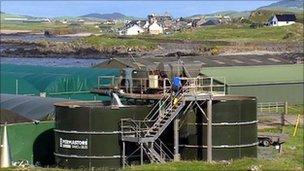Wrasse could help clean-up fish farms in Scotland
- Published
A proposal to use wrasse as cleaner fish to deal with sea lice is being considered by scientists in Machrihanish
It never occurred to me when I started on work on this investigation that at some point I might fall slightly in love with a species of fish.
But at an experimental facility near Machrahanish I met some wrasse - a fish with more personality than most.
The programme involves trying to breed two species of native fish, Ballan and Goldsinny wrasse.
Their fate - if the experiment is successful - is to live on fish farms off the Scottish coast. But no-one is proposing wrasse for tea.
Instead the hope is that these creatures might be able to help the fish farming industry with a problem that affects Atlantic salmon. Farming these far larger fish is a multi-million pound business.
But there have long been concerns about parasite levels on farmed salmon. Sea lice infect the fish, and can in extreme cases cause them to grow slowly or even die.
Underwater pens
So the industry has a major incentive to get rid of the parasites.
They are also under pressure from anglers and landowners to get rid of sea lice because of worries that they might infect passing wild salmon and sea trout.
So where do the wrasse come in?
They are cleaner fish - and the hope is that they might be able to live in the cages alongside the salmon and eat the parasites.

The wrasse are being bred at an experimental facility
That would reduce the industry's reliance on expensive chemical treatments, which may also be losing their effectiveness as lice develop resistance to the treatments.
At Machrahanish they are looking into creating a broodstock for the fish, so that wrasse would not have to be taken from the wild.
Scientists also want to establish how the animals can be looked after when kept in underwater pens with the salmon, and whether the new problems posed by caring for two species of fish at once can be resolved.
And elsewhere - particularly in Norway - sea trials are being run to see how the fish perform in the real world. The industry hopes this will be a solution to a difficult problem.
But what I was struck by was the personality shown by these fish. One researcher compared them to dogs, and they certainly seemed aware of me looking at them.
In fact one of the team told me he would struggle to go back to looking after salmon after learning to love his new charges.
I certainly came away with a sense that the industry is sincere about this project, and that I had unexpectedly met a creature with charisma.
BBC Scotland Investigates: Scotland's Fishy Secrets will be broadcast on BBC One Scotland at 22:35 on Tuesday 18 October, and then on the programme website.
- Published18 October 2011
- Published18 October 2011
- Published16 October 2011
- Published8 June 2011
- Published7 April 2011
- Published28 January 2011
- Published14 December 2010